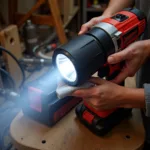Understanding child development is crucial, and using the right assessment tools in infant toddler care plays a vital role in this process. These tools help us track milestones, identify potential challenges, and tailor learning experiences to each child’s unique needs. In the first few years of life, development happens at an incredible pace, making regular assessment essential.
Why Are Assessment Tools Important in Infant Toddler Care?
Assessment tools provide a systematic way to observe and document a child’s progress across various developmental domains. This information is invaluable for educators, parents, and caregivers, helping them understand where a child excels and where they might need additional support. Early identification of developmental delays allows for timely intervention, maximizing the child’s potential.
Furthermore, assessment tools can help tailor individualized learning plans, creating a more enriching and effective learning environment for each child. By understanding a child’s strengths and weaknesses, educators can adapt activities and experiences to best support their growth.
Different Types of Assessment Tools
There is a wide range of assessment tools available for infant toddler care, each designed to capture different aspects of development. Some common types include:
-
Observation Checklists: These tools provide a structured way to observe specific behaviors and skills. They often focus on developmental milestones, such as walking, talking, and social interaction.
-
Anecdotal Records: These are detailed narratives of observed behaviors, offering rich qualitative data about a child’s development. They provide context and insights that checklists might miss.
-
Developmental Screening Tools: These standardized tools are designed to identify potential developmental delays or concerns. They are typically administered at specific ages and can be used to guide referrals for further evaluation.
-
Portfolios: These collections of a child’s work, such as drawings, paintings, and writing samples, provide a visual record of their progress over time. They offer a tangible way to see how a child’s skills and abilities are evolving.
-
Standardized Tests: While less common in infant toddler care than in later years, some standardized tests can assess specific areas of development, such as cognitive skills or language acquisition. These tests provide quantitative data that can be compared to norms.
How to Choose the Right Assessment Tools
Selecting appropriate assessment tools requires careful consideration of various factors, including the child’s age, developmental stage, and specific needs. It’s also essential to consider the purpose of the assessment and the resources available. Dr. Maria Sanchez, a renowned child psychologist, advises, “The best assessment tools are those that align with the child’s individual learning goals and provide actionable insights for educators and parents.”
Using Assessment Tools Effectively
Effective use of assessment tools goes beyond simply collecting data. It involves careful observation, thoughtful interpretation, and ongoing communication between educators, parents, and other caregivers. Regularly sharing assessment findings with parents helps them understand their child’s progress and participate actively in their learning journey. pain assessment tools in paediatric palliative care
What are the benefits of ongoing assessment?
Ongoing assessment provides a continuous stream of information about a child’s development, allowing educators and caregivers to adapt their approach as needed. It helps ensure that each child receives the appropriate level of support and challenge, promoting optimal growth and learning. Professor David Lee, an early childhood education expert, emphasizes, “Ongoing assessment is not just about measuring progress; it’s about understanding the child’s learning process and creating opportunities for growth.”
Conclusion
Types of assessment tools in infant toddler care are varied and crucial for understanding a child’s developmental journey. By utilizing a combination of observational methods, developmental screenings, and portfolios, educators and caregivers can gain a comprehensive understanding of each child’s strengths and areas for growth. This information, when used thoughtfully and communicated effectively, can significantly enhance the learning experiences of young children and support their overall development.
FAQs
- How often should assessments be conducted?
- What are some red flags to look for during assessments?
- How can parents be involved in the assessment process?
- Are there culturally sensitive assessment tools available?
- What happens if a developmental delay is identified?
- How are assessment results used to inform instruction?
- Where can I find more information about specific assessment tools?
Need help with car diagnostics? Contact us via WhatsApp: +1(641)206-8880, Email: cardiagtechworkshop@gmail.com or visit us at 910 Cedar Lane, Chicago, IL 60605, USA. Our customer service team is available 24/7.
